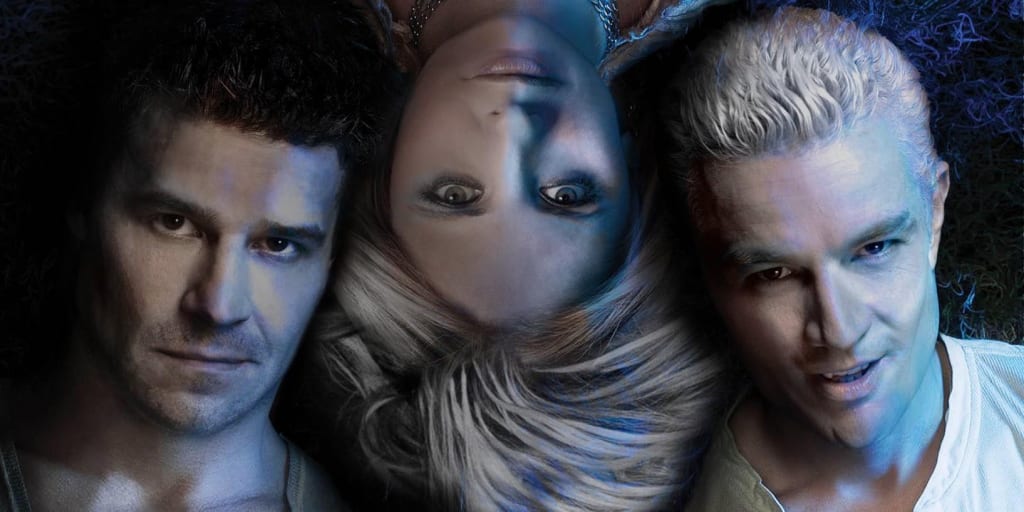7 Times 'Buffy the Vampire Slayer' Took on Real-World Issues with Horror
Turns out you can't fix real-life problems with Mr. Pointy.

‘90s kids, rejoice: Buffy the Vampire Slayer is coming back to the small screen. Buffy and her Scooby Gang got all kinds of after school specialed, buried under the clever guise of monsters and monster slaying. We might not have had to face literal demons in our personal lives, but Buffy taught us all about our metaphorical demons with her, you know, actual ones.
Coming Out
At the end of season two, as Buffy stared down the barrel of an apocalypse caused by her boyfriend and accidentally turned evil with sex, she had a moment of raw honesty with her mom about being the chosen one. Her mom threw all kinds of arguments against being the slayer at her—arguments any LGBTQ teen would instantly recognize as the kinds of things shocked parents say when their kid comes out of the closet.
Joyce’s gems include “have you tried not being the slayer?” and “It’s because you didn’t have a strong father figure, isn’t it?” Joyce, normally supportive mom extraordinaire, is every bad coming-out scenario all rolled into one—including tossing Buffy out of the house for refusing to back down on who she is.
Addiction
Willow Rosenberg is an icon for tons of reasons. She was every nerdy girl ever; she was part of one of the first lesbian kisses on television; and she did evil a lot better than most of Buffy’s villains (after the high school years, that is).
One of Willow’s best storylines revolves around her ever-growing fixation with magic—a fixation that turned into addiction, with many of the hallmarks that make addiction so dangerous. From her denial of the problem to manipulating her loved ones into thinking nothing was wrong (including literally brainwashing poor Tara), Willow’s addiction took her to more and more desperate places until she became the villain in their lives.
The only cure? Xander’s intervention and Giles’s rehab. Despite not going cold turkey with magic, he takes her remarkably close to real-life treatment programs, including counseling and group therapy with the British coven. Willow is a good girl, completely lovable and sweet, and it’s important that the show portrayed addiction as something that can happen to anyone.
Teacher/Student Relationships
One of the central themes of Buffy is the mentorship between Giles and Buffy. While they often went to more of a father/daughter relationship, the show often portrays teachers as valuable resources and mentors. In “The Witch,” Cordelia’s relationship with her English teacher draws out her intellectual side (if done in truly Cordelia-like fashion). In “Teacher’s Pet,” Buffy is encouraged by her science teacher.
While the show utilizes teachers as villains (“Teacher’s Pet” is another excellent example of this), there are tons of wholesome, kind, and supportive interactions between teachers and students. We see the teachers acting as mentors, encouraging students, and even acting as trauma counselors throughout the multitude of horrible things that happen when your school is on a hellmouth. Miss Calendar, Giles, and even Principal Flutie—for all his faults—counsel students whenever the drama gets particularly dramatic. Principal Flutie dragging Buffy into mandated counseling because she saw a dead body is a perfect example. These are all extraordinarily important roles for teachers to take, and in a show about being surrounded by evil, it’s good to see teachers portrayed as trustworthy and good.
The show also illustrates the flip side of the teacher/student relationship. “Teacher’s Pet” features a more disturbing relationship between Xander and the substitute teacher, who turns out to be a giant praying mantis. While most teachers aren’t Mary Kay LeTourneau, there are enough predators out there to make Xander’s lesson about getting romantically involved with your teacher an important one.
Online Predators
Season one featured some truly goofy monsters, none of which were goofier than the awkward attempts at putting the internet era on display. It’s super cringey now, but back in the ‘90s accuracy just meant the “you have mail” noise combined with that horrible dial-up sound.
Willow acted as the group’s gal Friday and hacking expert all rolled up into one, and her unrequited feelings for Xander often had her looking elsewhere for romance. Her innocence and naivete meant that when she met a guy online who professed his love for her, she fell for it. Too bad he turned out to be a demon/robot thing. While real-life online predators are typically flesh and blood, there were valuable lessons there about how much to trust someone online.
Abusive Relationships
Let’s face it: Angel and Buffy might be the OTP; their relationship was less than ideal. Forget the age difference—physical affection causes him to turn into a murder-y jerk. While it’s important for people to understand that the ones you love are capable of hurting you the most, there’s another relationship that shows how even good people can become incredibly toxic and hurt each other: Spike and Buffy.
For the record, everything about that relationship is disgusting—from Spike nearly raping Buffy in her bathroom to Buffy beating him senseless in an emotional rage. They’re both villains here. They’re both emotionally and physically abusive. Buffy is our undisputed hero, but in her relationship with Spike, she is a great example of how domestic abuse happens.
Suicide
The massacre at Columbine High School happened on April 20th, 1999. Originally scheduled to air the same date, season 3’s episode “Earshot” deals with mass murder and gun violence at school. The episode didn’t air until September of the same year.
“Earshot” strikes a remarkably close chord with Columbine, with a double twist: the perpetrator of the mass violence was the cafeteria lady, and the kid who brought the gun to school, Jonathan, wanted to commit suicide. While the mass violence is played to comedy, the suicide attempt is decidedly not. Buffy explores themes of loneliness and depression in “Earshot,” as well as the factors that can lead someone to contemplate ending their life. It is a sad and poignant episode.
Death
I have a list of the best movies I’ll never watch twice. It contains remarkable movies that make me feel so awful that I just can’t bring myself to experience them again, no matter how good they are. Sometimes TV sneaks into the list. Season 5’s “The Body” is one of those special guests.
Buffy features a lot of death. From the gut-wrenching shock of Jenny Calendar’s demise to the edge-of-your seat fight between Buffy and Faith, death is commonplace on a show about vampire slaying. Joyce’s passing, and the way “The Body” shows that passing, is a whole other animal. While there is a vampire fight in the episode, and the show’s immersion in magic and the supernatural brings a whole other context to nearly everything, Joyce’s death is very much a part of the natural world. It brings Buffy away from her role as a hero and into her roles as a daughter and a vulnerable young woman.
It’s a terrible episode, but only in that it’s so good you can’t help but grieve along with the gang. It is surreal in the way that the biggest and worst moments of our lives feel surreal. And as anyone who has ever lost someone close knows, there are moments that are unflinchingly accurate in their pain. It’s one of the reasons why Buffy is a landmark show and worthy of a reboot, though at this juncture it’s anyone’s guess if it will live up to the original. When something so silly can make you feel real, visceral pain, it deserves to be immortalized (pardon the pun).
About the Creator
Lynne Rush
Pop culture addict who loves books, video games, and TV.






Comments
There are no comments for this story
Be the first to respond and start the conversation.